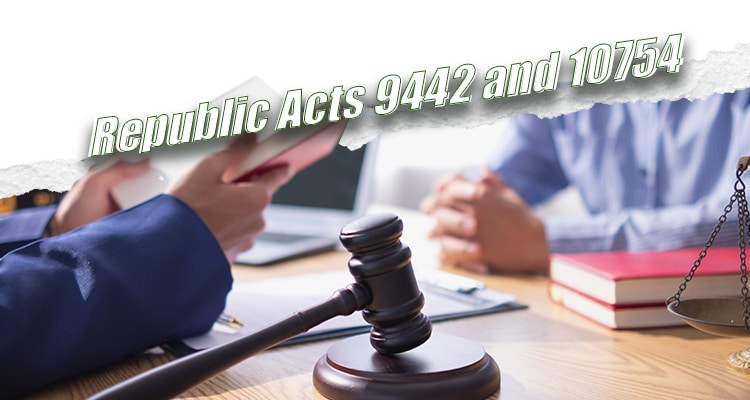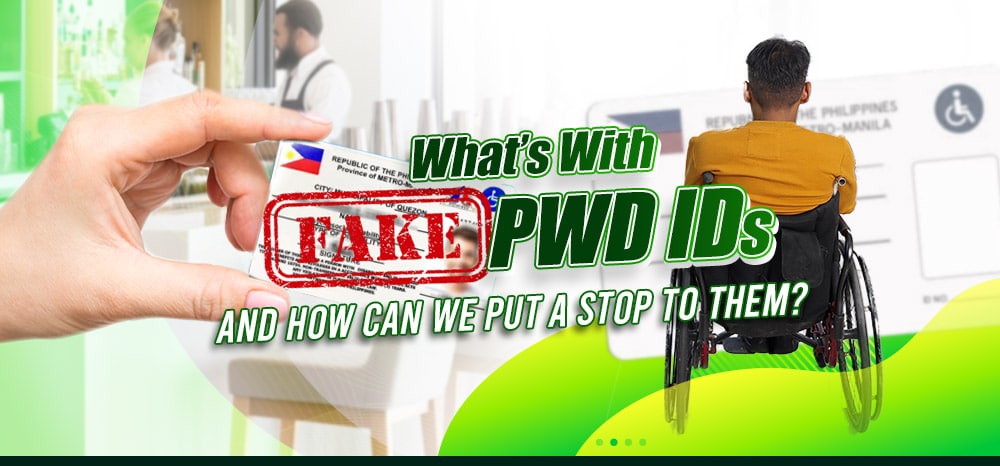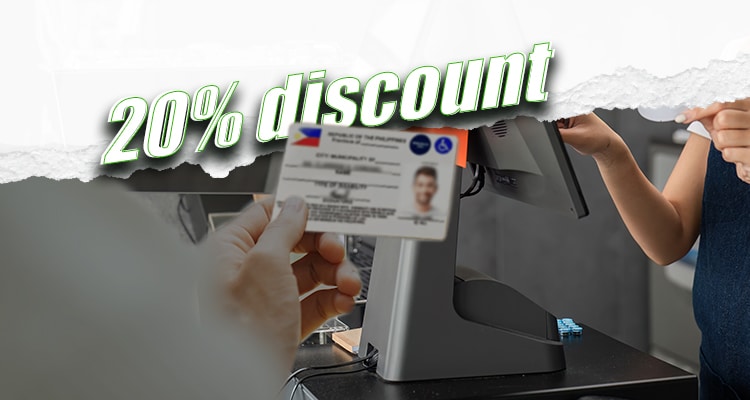For many Persons With Disabilities (PWDs), a PWD ID is a significant boon to their daily lives.
This ID entitles you to benefits like legally mandated discounts and VAT exemption on food, medicine, and recreational centers, PWD-only express lanes, and even tax bonuses.
Unfortunately, due to these benefits, many unscrupulous individuals are getting and taking advantage of fake PWD IDs.
Thus, the Restaurant Owners of the Philippines (RESTO PH) issued a statement last February 4 about the damaging impact of fake IDs on smaller restaurants and businesses.
Additionally, the growing number of fake PWD IDs has led to some questioning the validity of certain “invisible” disabilities like mental health conditions.
Here’s why this issue affects us all – and what you can do if you catch someone with a fake ID:
How Fake PWD IDs Are Being Used
Typically, pseudo-PWDs use their fake IDs to avail of the legally mandated twenty percent (20%) discount and VAT exemption in restaurants, recreation areas, and medical services.
This has led to instances of pilots presenting PWD cards for visual disability or couples who had a “conjugal disability,” according to RESTO PH President Eric Teng.
This leads to significant losses for many smaller restaurants and businesses since they shoulder the bulk of the cost.
While they can claim the discount as a tax-deductible expense, this only reduces their tax liability by a fraction of the discount’s cost.
Furthermore, the Bureau of Internal Revenue (BIR) ruled out further deductions for stores honoring senior and PWD discounts.
Fraudsters also use their fake IDs to commit tax evasion by falsifying their public documents. The government reported losing PHP 88.2 Billion due to these false IDs in 2023 alone.
Many fake ID users often cite the increasingly high cost of living as their primary reason for using them. After all, who would say no to the opportunity to save almost thirty-two percent (32%) when eating in a restaurant?

Legal Consequences of Using a Fake PWD ID
The primary laws concerning the issuance and usage of PWD IDs are Republic Acts 9442 and 10754.
Section 9 of RA 9442 states that any person who violates any of the Act’s provisions shall suffer the following penalties:
- For the first violation, a fine of not less than PHP 50,000 but not exceeding PHP 100,000 or imprisonment of not less than 6 months but not more than 2 years, or both at the discretion of the court; and
- For any subsequent violation, a fine of not less than PHP 100,000 but not exceeding PHP 200,000, or imprisonment for not less than 2 years but not more than 6 years, or both at the discretion of the court.
In addition, anybody caught abusing the privileges granted by these laws shall be punished with imprisonment of not less than 6 months or a fine of not less than PHP 5,000 but not more than PHP 50,000, or both, depending on the court’s discretion.
Recent Cases of Prosecution and Enforcement Efforts
Back in December 2024, the BIR announced that it would launch a nationwide crackdown on fake PWD IDs due to revenue loss from tax evasion.
Just last week, six fake PWD ID makers were nabbed in two police operations.
Before all these, there were already instances of people getting arrested for falsifying PWD IDs.

The Impact of Fake PWD IDs on Legitimate Beneficiaries
The growing prevalence of fake PWD IDs has led to a stigma against “invisible” disabilities like learning (Dyslexia) and mental disabilities.
This can lead to awkward situations where some restaurants and other establishments question the authenticity of their PWD status and may even deny them their rightful services and accommodations.
Additionally, seeing people abuse a system meant to help them can be frustrating for those with “invisible” disabilities, especially when they’re asked to show further “proof” of their condition.
Furthermore, pseudo-PWDs divert critical resources that genuine PWDs need, resulting in reduced financial assistance.

How Businesses and the Government Are Fighting Back
Aside from RESTO PH’s post, several other restaurants reported encountering fake PWD IDs and are urging the government to take action.
To counter this surge of fake PWD IDs, the Department of Social Welfare and Development (DSWD) plans to establish a unified PWD ID system to easily determine genuine ones from fakes.
This new unified system will have a standardized design and employ a web-based portal to help prevent potential abuse. Furthermore, the new ID will be RFID-enabled and feature the holder’s biometrics data.
As mentioned above, the police and the National Bureau of Investigation (NBI) have begun a nationwide crackdown against suspected producers of fake IDs.

The Role of Online Jobs and Remote Work in PWD Employment
Although a PWD ID helps ease some of a PWD’s financial burdens, having their own full-time job is even more empowering.
Having their own income reduces their reliance on government support and bolsters their self-reliance.
However, this can be challenging due to their conditions and the limited number of companies offering work for PWDs.
Fortunately, this all changed with the growing popularity of work from jobs.
Here, PWD workers no longer have to worry about commuting, so they don’t need to worry about inaccessible public transportation or crowded offices.
Additionally, working from home gives them easy access to their assistive devices so they can work comfortably and effectively.
An online work from home setup also reduces the risk of workplace discrimination, as results and skills matter here more than physical appearance.
For a deeper look at remote work’s benefits to PWD workers, click here.
Increasing Access to Web-Based Employment for People With Disabilities
In theory, an online setup offers more opportunities for PWD workers; in reality, finding them can be challenging without the right qualifications and connections.
Here’s how you can improve your chances of landing online jobs:
- Enhance Your Digital Literacy and Skills:
- Invest in online courses on sites like Udemy or Coursera to learn in-demand skills like digital marketing, graphic design, or data analysis.
- Network in Remote Work Communities:
- Connect with industry peers by joining PWD or remote worker-specific groups on social media and attending online seminars.
- Building these connections can help lead to job referrals, mentorship opportunities, and collaboration opportunities.
- Consider Freelancing or Online Entrepreneurship:
- Exploring freelance gigs or even starting your own business can help you gain valuable skills and improve your qualifications.
- Build Your Online Portfolio:
- Create a professional website or digital portfolio showcasing your accomplished projects, skills, and achievements.
How to Report Fake PWD ID Usage
Have you encountered a pseudo-PWD? Here’s how you can report them:
Steps for Reporting Fraud
If you suspect someone is using a fake PWD ID or worse, selling them, first note the time, date, and location of the suspicious activity.
Afterwards, note down any inconsistencies you spot on the card, like misspellings, the wrong seal of the city/town that issued it, etc.
Next, report the incident to your local Persons With Disabilities Affairs Office (PDAO) or the Department of Social Welfare and Development (DSWD). Besides these agencies, you can also send a formal email to the National Council on Disability Affairs (NCDA).
Finally, you can also file a complaint with your local police if you believe this misuse is part of a larger fraudulent scheme.
Government Hotlines and Online Portals for Complaints
To report PWD ID misuse, you can contact the appropriate authorities through the following channels:
- NCDA:
- Email: council@ncda.gov.ph
- Aside from their email, you can also contact them via their social media page on Facebook.
- DSWD:
- Email: inquiry@dswd.gov.ph or https://i-grs.dswd.gov.ph/ for complaints
- Globe: 09171105686 and 09178272543
- Smart: 09199116200
- (632) 8-931-81-01 to 07
How Citizens Can Help Stop This Illegal Practice
Aside from reporting users and producers of fake PWD IDs, you can also familiarize yourself with the features of authentic IDs and share this information with your loved ones so that more people are on the lookout.
Furthermore, you can also share the proper procedure on how to get authentic PWD IDs within your community so the ones who actually need it won’t feel the need to resort to illegal means.

FAQs
Here are some of the most common questions people ask regarding the current spread of fake PWD IDs:
How Can I Verify if a PWD ID is Legitimate?
The first step to determining a PWD ID’s authenticity is by checking it for official seals, holograms, and watermarks.
Check if the card’s information, like the name, photo, ID number, issuance date, and expiration, matches official records and shows no signs of tampering.
Another way to confirm a card’s authenticity is by consulting the Department of Health’s Philippine Registry for Persons With Disability.
Unfortunately, as the database is currently incomplete, some authentic PWD IDs may not appear on it.
To address this concern, DOH stated that legitimate PWD IDs remain valid even if they don’t appear in the database.
Furthermore, the department urged PWDs to confirm the validity of their IDs with their local Persons With Disability Affairs Office (PDAO).
Aside from updating its database, DSWD is also planning to standardize PWD IDs and incorporate features like RFID technology and biometrics data.
What Should I Do if I Encounter Someone Using a Fake PWD ID?
If you encounter a pseudo-PWD, it’s best not to directly confront them about it and, instead, note the date, time, location, and details of the incident.
Once you’ve gathered enough evidence, report the incident to your local DSWD/PDAO office or the NCDA.
Are Businesses Required To Honor All PWD IDs Without Verification?
Yes, businesses are mandated by law (specifically, RA 10754) to grant someone a discount when they present their PWD IDs. No extra ID verification is required.
There was an incident last year where the company operating Starbucks in the Philippines apologized for posting a sign that limited the 20% discount for Seniors and PWDs to just 1 menu item or drink per visit.
Because of the various benefits it provides, many unscrupulous individuals today are using fake PWD IDs to save money.
However, by doing so, they’re undermining the most vulnerable members of society who need it the most, especially those with “invisible” disabilities.
To counter this, the government has instituted a national crackdown on pseudo-PWDs and those making false IDs. Additionally, the DSWD plans to establish a unified PWD ID system and additional security measures to ensure their authenticity.
However, they can’t do this alone. Only by working together with the authorities and reporting those who use or manufacture fake PWD IDs can we stop this practice.
Looking for online work that’s well-suited for PWDs? Remote Staff is here to help.
Our jobs list contains plenty of positions to choose from. These range from virtual assistant jobs and online transcription jobs to online writing jobs and online design jobs.
Ready to start your online career? Click here. Good luck!


